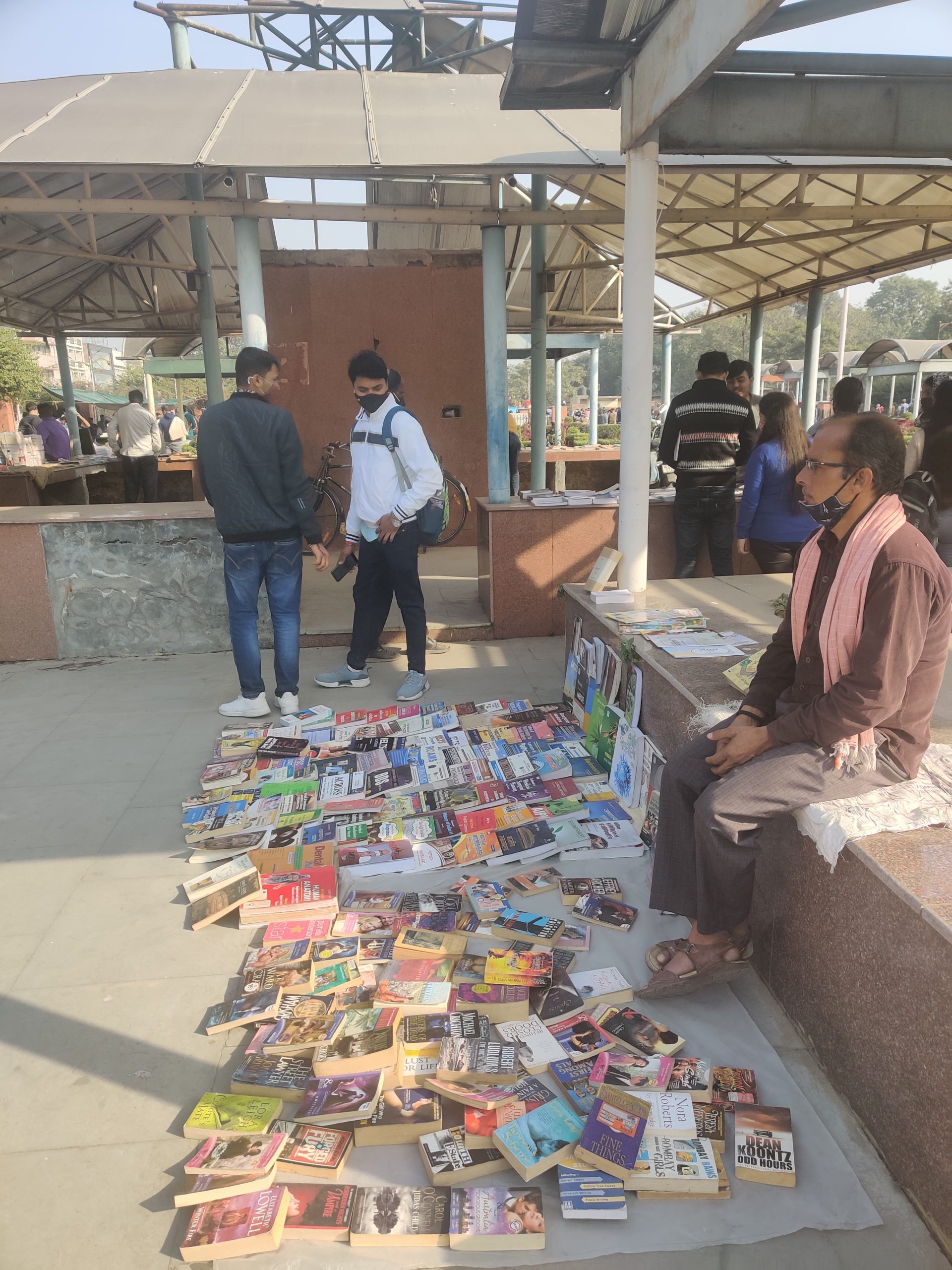
Raj Kumar at his bookstall with hardly any customers. All photos : Kshitij Ojha
“Selling books is the only source of livelihood for us and whenever it looks like things are going to be okay, a new wave eats up all our savings and leaves us with no source of income”, says Chandra Mohan Jha. He is a book vendor at the Daryaganj Sunday Book Market. He further adds, “It’s been two weeks of weekend curfew and I have lost a significant amount of money already. If they do not lift the curfew in the next couple of weeks I would be forced to go back to my village.”
Jha hails from Madhubani district in Bihar, he has been selling books at the Daryaganj book market for close to three decades. But the last couple of years have seen his business decline manifold due to the Covid-19 pandemic.
Jha, while talking to the Patriot in December mentioned that his business was getting on track after a hard time during the second wave. “The sales only started improving from late October as the weather became colder and the heat became bearable. But things are back to where they were six months ago as the Delhi government announced a weekend curfew on 5 January.”
Jha had to shut shop even during the first wave of Covid when a nationwide lockdown was announced in March 2020. He had returned to the village. Once things had settled down, he returned to Delhi, but this time he only came back with his son and left his wife at his hometown.
Jha lives with his son in Burari. His son, Sumit, is preparing for CA exams. As per Jha, he is still able to survive in Delhi even with all these losses in his business because his son earns around Rs 6,000 by taking tuitions.
Around 250 book vendors have been affected because of the weekend curfew.
Raj Kumar is in his late thirties. He has been selling books at the Sunday book market for almost a decade. He too is a migrant. He hails from UP. His primary job is at a pharmaceutical company in Old Delhi which pays him a salary of around Rs 16,000 per month. On being asked what prompted him to sell books at the market, he says, “It helps in earning extra income.” Kumar lives alone in a rented house in Delhi. The rent for the room is Rs 4,000.
Kumar says, “By selling books on Sundays I earn around Rs 4,000-5,000 a month which helps me pay the house rent. I send most of my salary to my family back in my village.” Now since the book market has been closed for two weeks and it does not seem like the market would reopen soon, Kumar would have to pay the rent from his salary.
Kumar is worried that if the market remains closed for even one more month, his savings would start getting exhausted and the money he sends back home would be much less. He says, “The prices of everything is rising, from petrol to essential oil. How is one supposed to survive? The extra income at least took care of the rent, now that too would have to be paid from the salary.”
The book vendors at the Daryaganj Sunday Book Market have not only been affected by Covid-19 but have also been affected by a change in location.
Just before Covid-19 struck India, the Daryaganj Sunday book market was shifted from its original location to Mahila Haat. The main market which used to stretch between Delite and Golcha cinemas amidst the old historical buildings in Old Delhi was ordered to shut by an order of the Delhi High Court. The court had directed the North Delhi Municipal Corporation (NDMC) to shut all markets at Netaji Subhash Marg.
As the vendors were settling into their new location, the Covid-19 pandemic and the subsequent lockdowns meant that the vendors could not just settle down their business as they would have liked.
Jha primarily sells medical books. While talking to the Patriot about the dip in sales, he said, “Earlier when I used to sit out on the pavement, before Covid, I used to earn Rs 5,000-6,000 each Sunday. Now it has come down to as low as Rs 600-1,000.”
On the principle of 'Sarvajan Hitaya, Sarvajan Sukhaya' -- Welfare for all, Happiness for all…
With hundreds reported missing in Delhi this year, this guide explains how families can use…
The case came to light after a 35-year-old woman from Panipat alleged that she had…
During the investigation, CCTV footage helped identify the suspects, according to Delhi Police
The launch took place during the inauguration of the Delhi Police Exhibition Hall at Connaught…
The 28-year-old factory owner was taken to Satyawadi Raja Harish Chandra Hospital in Delhi, while…